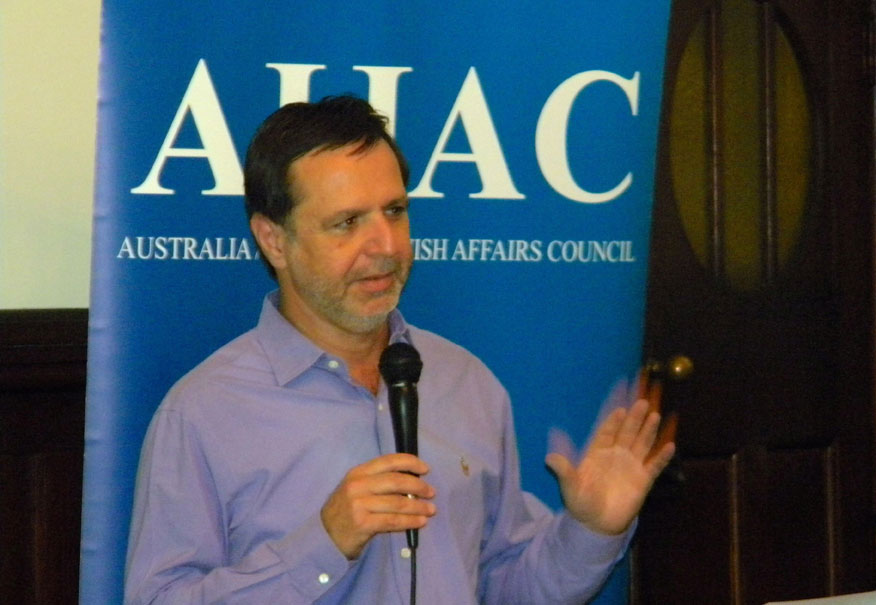Australia/Israel Review
Peace and the Partnership Problem
Mar 19, 2014 | Ahron Shapiro

Ahron Shapiro
Khaled Abu Toameh, veteran Palestinian Affairs reporter for the Jerusalem Post and other major international media, told a group of AIJAC supporters in Melbourne on February 28 that current US-brokered peace talks between Israel and the Palestinians appeared almost certain to fail no matter what Israel says or does, principally because Israel’s negotiating partner Palestinian President Mahmoud Abbas lacks the credibility and mandate to implement any agreement.
The reporter and analyst – renowned for his excellent and extensive contacts in both Gaza and the West Bank – said that even assuming Abbas is truly interested in peace with Israel, years of relentless Palestinian government-sanctioned incitement has made it practically impossible for any Palestinian official to make peace lest they be branded a “traitor”.
The question that should be asked about Abbas is not whether or not he desires peace with Israel but “whether this man can deliver”, Abu Toameh said, “and the answer, obviously, is ‘no’.”
“Where would he implement such an agreement?” Abu Toameh asked sarcastically, “in downtown Ramallah or in Tel Aviv?”
Abu Toameh said the lack of a unified, powerful and universally respected Palestinian leader makes peace negotiations almost certainly an exercise in futility. “Here is our peace partner Mahmoud Abbas, being a very problematic partner,” he said. “He doesn’t have the power to implement an agreement on the ground and he doesn’t even have a mandate from his people to negotiate or sign any agreement with Israel.”
Abu Toameh said that, in his estimation, most Palestinians are currently holding out for a one-state solution whereby Israel is replaced with a state with a Palestinian majority.
“I’m not saying, God forbid, Palestinians don’t want peace… What I’m saying is, the Palestinians are divided into two camps. Not only geographically, but also ideologically. One camp is the radical camp [including Hamas]. It does not want to deliver.”
This camp wants an Islamic state from the Jordan River to the Mediterranean and might be willing to tolerate only a Jewish minority in a Palestinian state encompassing all of Israel, Abu Toameh said.
People who say these radicals don’t represent a substantial number of Palestinians “don’t know what they’re talking about”, Abu Toameh said. “I personally believe this may represent more than 50% of the Palestinians.”
The second camp, he said, is “the PLO led camp, or as they are called in the West, the moderate camp.” Yet, as he stressed, they lack support and legitimacy, with no presidential elections for almost ten years and no parliamentary elections for more than seven.
Abu Toameh said the current situation was a direct result of poor implementation of the 1993 Oslo Accords “based on the assumption that if you dumped the PLO in the West Bank and Gaza and you start pouring billions of dollars on [late PLO leader] Yasser Arafat and you give him guns without holding him accountable, you’re going to get peace.”
The outcome of this deeply flawed strategy, he said, was the terror bombing wave of the 1990s, the rejected peace deals at Camp David and Taba and the Second Intifada. It also led to the success of Hamas on an anti-corruption platform in 2006 Palestinian elections.
“If Bibi Netanyahu had run” under the same banner of anti-corruption, Abu Toameh joked, “he also would have won the election.” And PLO cronyism and corruption continues to be a serious problem, he added.
Abu Toameh stressed that he was not trying to sound pessimistic, but simply “realistic” about the current situation in the West Bank and Gaza.
“Gaza, unfortunately, is a lost case,” Abu Toameh said, “because if anyone thinks that if you bring down Hamas in Gaza, you will get something better than Hamas, I’m sorry to tell you, you might even miss Hamas.”
Regarding the West Bank, the journalist asserted “if Israel pulled out tomorrow morning from any part of the West Bank, or from all of the West Bank, the PLO is going to collapse and you will have another Islamic state in the West Bank, and that would be a recipe for another war. If you want to give land, that’s fine. But at least give it to someone who can take control over it, and not someone who is going to run away and hand it over to someone else. We’ve been to this movie before and we paid a very heavy price.”
Abu Toameh pointedly warned Israel against agreeing to remove its troops from the Jordan Valley border region – something which the US has been pushing for as part of any agreement. He said that this is a move which Jordanian officials also discretely oppose. “If [the IDF withdraws from the Jordan River], I may seek political asylum in Australia,” he quipped.
“How can you move forward with the peace process?” Abu Toameh asked, “The answer is very simple: You cannot move forward with any peace process when we don’t have anyone to deal with on the Palestinian side.”
Given the current situation, Abu Toameh said Israel’s best course of action might be to send a message to the Palestinians along the following lines: “We the Jews are prepared to give you what we were never prepared to give you in the past… When you guys, the Palestinians, get your act together and you reunite yourselves… and more importantly, you stop delegitimising Israel and demonising Jews and you stop calling for jihad and you recognise our right to exist over here, please come. Here’s the negotiating table. But in the meantime, be careful. Don’t shoot at me, because I’m going to shoot back. That’s all Israel can do under the current circumstances.”
Tags: Israel






